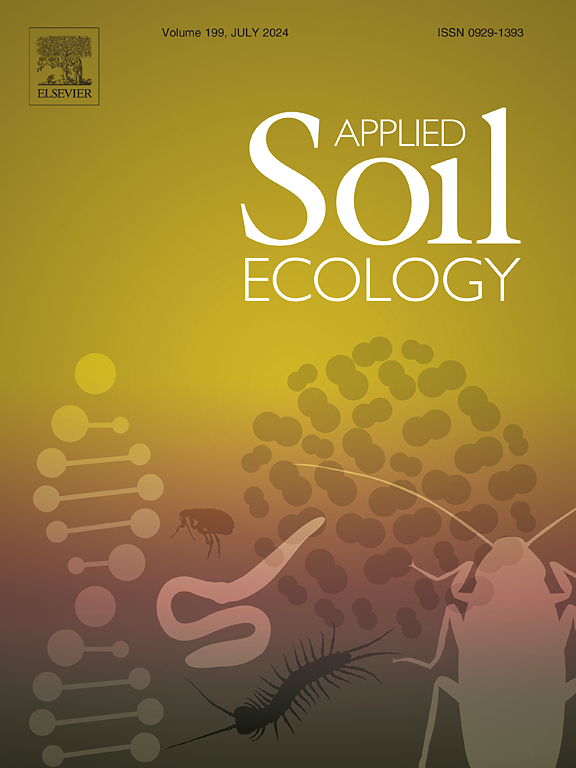Organic versus conventional agriculture in Cyprus: An analysis of soil bacterial communities in apple orchards and barley field
IF 4.8
2区 农林科学
Q1 SOIL SCIENCE
引用次数: 0
Abstract
This study aimed to elucidate the influence of agricultural systems on the soil bacterial communities in barley fields and apple orchards. Employing high-throughput sequencing, we profiled the bacterial communities in both crops under organic and conventional farming systems. Although no significant variations were observed at the phylum level, substantial differentiation was evident at lower taxonomic levels, highlighting the importance of farming practices on shaping soil microbiota. Under organic farming, we observed an enrichment of certain bacterial genera, potentially playing vital roles in enhancing soil health and fertility. On the contrary, unique bacterial genera thrived under conventional farming practices. Redundancy analysis revealed a significant role of soil physicochemical properties in determining bacterial community composition, accounting for >50 % of the observed variance. Notably, NH4+, K+, Mg2+, P-Olsen, and pH, were identified as major predictors of bacterial composition. The current study underscores the influence of farming system on the soil bacteriome and shed light on its potential implications for soil health and crop productivity. This research contributes to our understanding of how farming practices influence the soil bacterial assemblies and provides valuable insights for refining sustainable farming strategies. Future investigations are warranted to elucidate the functional roles of the identified bioindicators in soil health and productivity.
塞浦路斯有机农业与传统农业:苹果园和大麦田土壤细菌群落分析
本研究旨在阐明不同农业制度对大麦田和苹果园土壤细菌群落的影响。采用高通量测序,我们分析了有机和传统耕作系统下作物的细菌群落。虽然在门水平上没有观察到显著的变化,但在较低的分类水平上存在明显的分化,这突出了耕作方式对土壤微生物群形成的重要性。在有机耕作下,我们观察到某些细菌属的丰富,可能在提高土壤健康和肥力方面发挥重要作用。相反,独特的细菌属在传统的耕作方式下茁壮成长。冗余分析显示,土壤理化性质在决定细菌群落组成方面起着重要作用,占观察到的方差的50%。值得注意的是,NH4+、K+、Mg2+、P-Olsen和pH被确定为细菌组成的主要预测因子。目前的研究强调了耕作制度对土壤细菌群的影响,并揭示了其对土壤健康和作物生产力的潜在影响。这项研究有助于我们理解农业实践如何影响土壤细菌组合,并为改进可持续农业战略提供有价值的见解。未来的研究需要进一步阐明所鉴定的生物指标在土壤健康和生产力中的功能作用。
本文章由计算机程序翻译,如有差异,请以英文原文为准。
求助全文
约1分钟内获得全文
求助全文
来源期刊

Applied Soil Ecology
农林科学-土壤科学
CiteScore
9.70
自引率
4.20%
发文量
363
审稿时长
5.3 months
期刊介绍:
Applied Soil Ecology addresses the role of soil organisms and their interactions in relation to: sustainability and productivity, nutrient cycling and other soil processes, the maintenance of soil functions, the impact of human activities on soil ecosystems and bio(techno)logical control of soil-inhabiting pests, diseases and weeds.
 求助内容:
求助内容: 应助结果提醒方式:
应助结果提醒方式:


